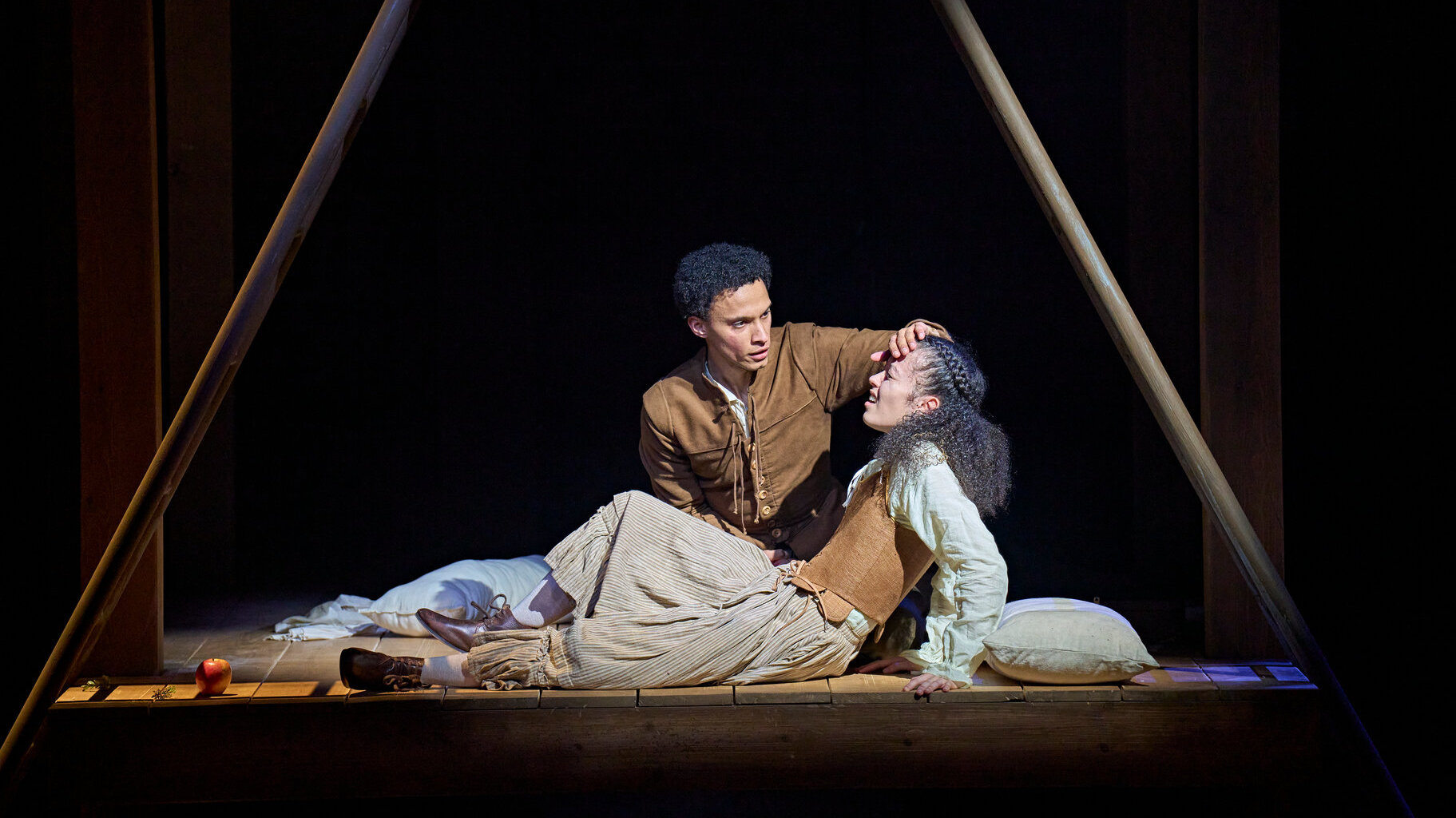The story of Hamnet, Shakespeare's only son is a powerful one of grief and separation guilt although Maggie Farrell who wrote the book on which the play is based had very little documentary evidence to guide the story, so she had to effectively join the dots and imagined the scenes between Shakespeare’s known marriage to Agnes (pronounced here ann-nez) Hathaway and his subsequent success over a decade later as a playwright in London. Both stories take their time in setting up the large number of characters connected to their stories which makes the first Acts rather linear and narrative based but both explode when the tragedies strike and the human impact is laid before us in a way that it is impossible not to be moved by.
At the heart of the play is the relationship between Agnes, played so beautifully by Madeline Mantock and Will, played by Tom Varey. She wonderfully portrays her seduction & love for Will, then the challenges of 16th-century childbirth (with the recollection of her own mother’s death in childbirth), the loving care for a seriously ill child and the horror, grief and guilt over her child’s death. It is an intensely powerful and simply staged scene in which Hamnet dies and is buried which creates an image that stays with you long after you live the Theatre. The three children are very well acted creating distinctive stage presences, Harmony Rose-Bremner is the older sister Susanna, a serious irritated child in contrast with the younger sister Judith, played by Alex Jarrett and her twin brother Hamnet, Ajani Cabey who are playful and caring eleven-year-olds. If anything, we deserved and wanted to see more of Hamnet and his relationship with his family and his appearances, like his life were too short.
.tmb-img-1824.jpeg) The contrast between the first half narrative exposition which introduces us to Shakespeare's violent father (Peter Wright), mother (Elizabeth Rider), sister (Frankie Hastings), stepmother-in-law (Sarah Belcher) and brother-in-law (Obioma Ugoala) and the second half scenes in London with the actor's Kemp (Peter Wright) and Burbage (Will Brown) feels odd, almost as if written by a different hand. In Act 2 we hear scenes and references to a romance between rival families in Romeo & Juliet, the twins in Comedy of Errors and the tragedy of Hamlet which appear to imply they have been drawn from Shakespeare's experiences back in Stratford, but we had no real hint of his writing ambitions in Act 1 nor signs (that I noticed) of his future storytelling. This does give a curious imbalance to the show, but the power of the second half makes it worthwhile and offers some imagined insight into his creative power and why he and Agnes remained married until his death.
The contrast between the first half narrative exposition which introduces us to Shakespeare's violent father (Peter Wright), mother (Elizabeth Rider), sister (Frankie Hastings), stepmother-in-law (Sarah Belcher) and brother-in-law (Obioma Ugoala) and the second half scenes in London with the actor's Kemp (Peter Wright) and Burbage (Will Brown) feels odd, almost as if written by a different hand. In Act 2 we hear scenes and references to a romance between rival families in Romeo & Juliet, the twins in Comedy of Errors and the tragedy of Hamlet which appear to imply they have been drawn from Shakespeare's experiences back in Stratford, but we had no real hint of his writing ambitions in Act 1 nor signs (that I noticed) of his future storytelling. This does give a curious imbalance to the show, but the power of the second half makes it worthwhile and offers some imagined insight into his creative power and why he and Agnes remained married until his death.Director Erica Whyman and Designer Tom Piper use the stage space well and signal the family's growing prosperity with costume changes and simple adjustments to the staging. The placing of the death bed downstage on the thrust stage created an intimacy and connection which is strong and differentiated from their loft bedroom and consummation of love. The creation of the Globe stage is slickly executed as the story moves forward with a nice comic touch when the actors nearly fall into the audience’s lap.
 It is extraordinary that 420 years after Hamlet was written, we should still be interested in the author’s family history that might have inspired it and that actors like Sir Ian McKellen, in my view the greatest living Shakespeare actor, can still hold audiences spellbound by his words. It is right and proper that the RSC should include Hamnet in their repertoire and hardly a surprise that the Swan run is sold out. We remain fascinated by his legacy and despite the changes in society, the grief of family loss never changes whether a sixteenth-century loss or a 20th-century Titanic passenger or crew loss, the human interest in these stories connects us and live theatre creates an experience that is powerful and moving.
It is extraordinary that 420 years after Hamlet was written, we should still be interested in the author’s family history that might have inspired it and that actors like Sir Ian McKellen, in my view the greatest living Shakespeare actor, can still hold audiences spellbound by his words. It is right and proper that the RSC should include Hamnet in their repertoire and hardly a surprise that the Swan run is sold out. We remain fascinated by his legacy and despite the changes in society, the grief of family loss never changes whether a sixteenth-century loss or a 20th-century Titanic passenger or crew loss, the human interest in these stories connects us and live theatre creates an experience that is powerful and moving. Review by Nick Wayne
Rating: ★★★★
Seat: Stalls, Row D | Price of Ticket: £45

